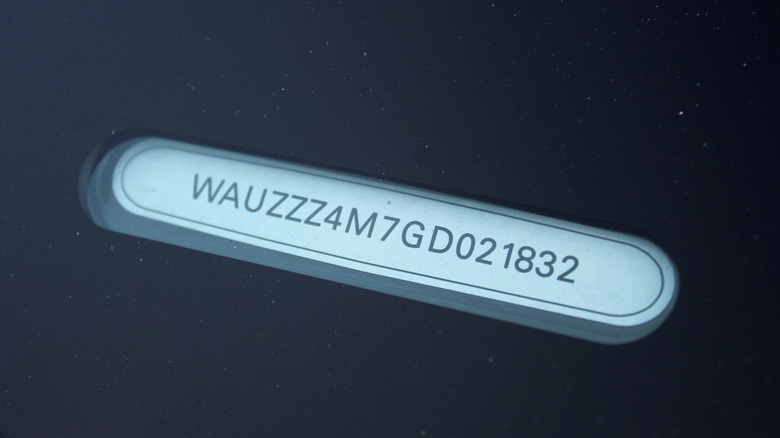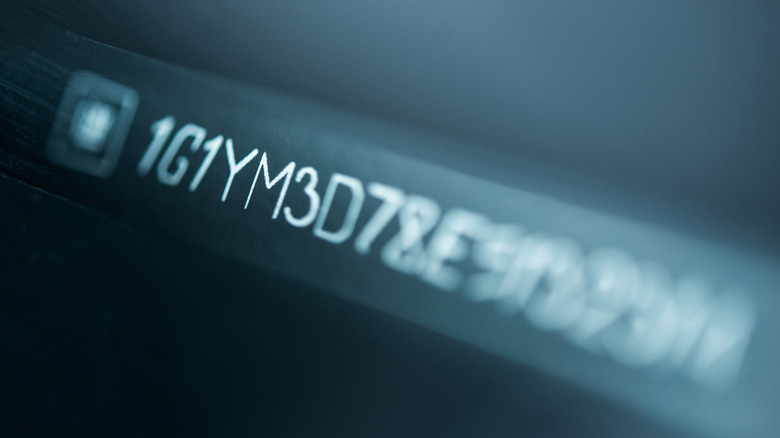How To Find Your VIN Number, And Why It's Important
If you're an automobile owner, then it's not exactly news to you that a lot goes into taking on such a responsibility. There's a lot of upkeep and routine maintenance that has to happen to keep it running efficiently, and you should learn to recognize when something is wrong and bigger repairs are needed. Further, making vehicle ownership a time and effort-heavy endeavor is the extensive paperwork that goes along with it. There are eight different car titles you should be aware of, plus ironing out loan agreements can be a hassle, and registration and inspections need to be renewed on a regular basis.
Along with all of this, there's the ever-important VIN number to keep in mind. For decades, these collections of 17 digits have served as identification for vehicles of all shapes and sizes that are unique to each individual unit. Digging deeper into them, they contain a lot of key information about your vehicle. The first two digits reveal where it was made, the third indicates the manufacturer, four through eight reveal the brand, engine size, and type, nine is the security code, 10 is the year, 11 reveals the assembly factory, and 12 through 17 is the serial number. If you're not aware of your ride's VIN number, thankfully, it's not too difficult to find.
A VIN number is found in a few different places
The hunt for your vehicle's VIN number doesn't have to go much further than the vehicle itself. There are several places on your car or truck that you can look to spot your VIN number, including underneath the lower corner of the windshield on the driver's side, on the driver's side doorjamb, under the hood at the front of the engine block, and on the front end of the car's frame in the case of some older cars. Sometimes it can even be found underneath the front passenger seat. If you're unable to access any of these hiding places or the vehicle in question as a whole, you're not out of luck.
Even without the car you need the VIN number for on hand, there are ways to access it. You should be able to find it on key documentation connected to the car, such as the title, registration form, and insurance policy and card. Lease information and your promissory note should include the VIN number as well. Once you do find it, if you're looking into specific information associated with it, you can decode your VIN with the National Highway Traffic Safety Administration's online VIN decoder.
One might think that this is a lot of work just to learn a bit about a vehicle, but there's more to it than that. A VIN number is important for automobile owners for multiple reasons.
The need for a VIN number
There's a lot of information within a VIN number pertaining to where a vehicle comes from, its make, and the engine within, but that's not all it's good for. It can be looked up to reveal the automobile's service and repair history, as well as if it has received a salvage title at one point. The VIN makes it easy to look into car safety recalls announced, and it can be used to impact your insurance rates. If your vehicle has been involved in an accident deemed major by an insurance provider, you may end up with a higher insurance premium. Alternatively, your VIN could help you save money on your car instead of solely costing you more through insurance.
Overall, a VIN isn't a secret, so it's not uncommon for it to be given out when a car is being sold. This way, potential buyers can use it to look up the car and its history before forking over the cash to buy it. If you're trying to sell through an online car marketplace, it's often required that you include the VIN in your listing for this exact reason. Still, you don't exactly want to give it to just anyone, as there are bad-faith actors out there who will use it for nefarious purposes. VIN cloning, where someone alters documents using a random VIN to steal a car, is far from unheard of, hence why it's worth trying out some of the tips to prevent your car from being stolen.
While some might use VIN numbers for malicious acts, there's no denying that when utilized for the right reasons, there's a lot to get out of them.


